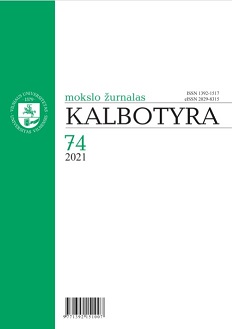La multifonctionnalité des constructions françaises avec le verbe finir : étude basée sur un corpus français-lituanien
Multifunctionality of the French Verb Finir ‘to Finish’ Based Constructions: a Corpus-Based Study of French and Lithuanian
Author(s): Vita Valiukienė, Lina Dubikaltytė-RaugalienėSubject(s): Morphology, Syntax, Semantics, Pragmatics, Comparative Linguistics
Published by: Vilniaus Universiteto Leidykla
Keywords: discourse connector; multifunctionality; parenthetical construction; sentence adverbial; temporal adverb;
Summary/Abstract: Based on the Corpus parallèle de Textes Littéraires (CTLFR-LT), consisting of French fiction texts and their translations into Lithuanian, the present article aims to show the functional versatility of the French verb finir ‘to finish’. The paper focuses on the following particular constructions: S((in)anim) + finir + (GN); S((in)anim) + (en) finir de + V(inf); S ((in)anim) + finir par + V(inf); pour finir. While retaining its literal meaning, the verb finir ‘to finish’ exhibits a great range of modally marked uses. These uses, considered peripheral in the majority of French monolingual and bilingual grammars or dictionaries, nevertheless appear to be statistically very significant in the present dataset. The study shows that the verb finir ‘to finish’ can be used as a component of various constructions in which it loses its core lexical meaning and functions as an adverbial or discourse connector. The analysis of the data of the corpus Corpus parallèle de Textes Littéraires merely confirms the fact that the constructions under consideration can have a two-fold reading: the adverbial function of time and the function of a sentence adverbial.
Journal: Kalbotyra
- Issue Year: 2021
- Issue No: 74
- Page Range: 247-267
- Page Count: 21
- Language: French

